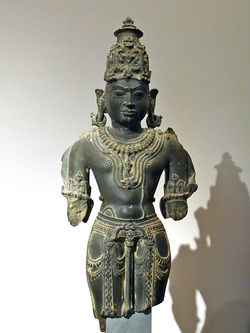Vaishnavism is one of the major traditions within the broader Vedic, or Hindu, spiritual culture. Unlike some Vedic traditions, Vaishnavas believe that the ultimate reality is personal. Thus, they understand that God is the Supreme all-attractive person, or Krishna. They acknowledge that all living beings are eternal persons, and that all life’s problems are rooted in the individual soul’s forgetfulness of his or her relationship with God.[1]
Contents
Vaishnavites, like Saivites, believe that there is only one Supreme God, who simultaneously permeates all creation and exists beyond it, being both immanent and transcendent. Like other Hindu denominations, Vaishnavism acknowledges the existence of many lower Gods under the Supreme One. These gods, like all of creation, are encompassed by Vishnu, either as manifestations of the Supreme Being or as powerful entities who are permeated by Him.
The distinctive religious belief of Vaishnavism is its emphasis on God as a personal being; i.e., someone you can know and have a relationship with. Vaishnavas often identify six qualities of God: all knowledge, all power, supreme majesty, supreme strength, unlimited energy and total self-sufficiency. One popular name for God among Vaishnavites is an ancient name from the Vedas: Purushottama, "the Supreme Person." For most Vaishnavas, the divine Self within is Vishnu himself, but not all of Vishnu. In other words, Vishnu is more than the Self and more than the universe. Likewise, when a Vaishnavite merges into God upon liberation, his or her individual nature is not lost. Vaishnavites believe people are meant to be God's companions for all eternity. Many Vaishnavas emphasize Vishnu's consort Lakshmi as much, if not more, than Vishnu. She is regarded not as another God, but as another aspect of the Supreme God. Many Vaishnavas call Lakshmi "Sri" (pronounced "shree"), which means "auspicious one."[2]





